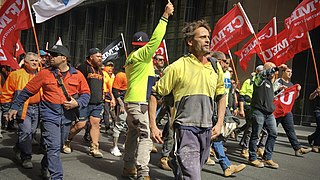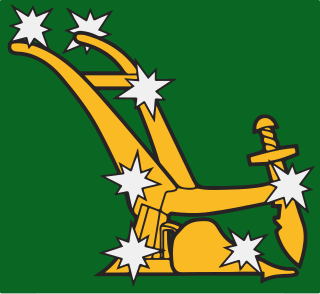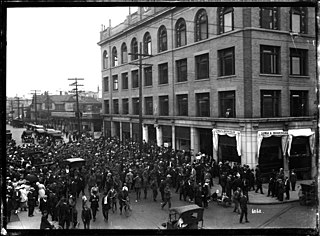Labour laws are those that mediate the relationship between workers, employing entities, trade unions, and the government. Collective labour law relates to the tripartite relationship between employee, employer, and union.

Strike action, also called labor strike, labour strike, or simply strike, is a work stoppage caused by the mass refusal of employees to work. A strike usually takes place in response to employee grievances. Strikes became common during the Industrial Revolution, when mass labor became important in factories and mines. As striking became a more common practice, governments were often pushed to act. When government intervention occurred, it was rarely neutral or amicable. Early strikes were often deemed unlawful conspiracies or anti-competitive cartel action and many were subject to massive legal repression by state police, federal military power, and federal courts. Many Western nations legalized striking under certain conditions in the late 19th and early 20th centuries.

The Irish Citizen Army, or ICA, was a small paramilitary group of trained trade union volunteers from the Irish Transport and General Workers' Union (ITGWU) established in Dublin for the defence of workers' demonstrations from the Dublin Metropolitan Police. It was formed by James Larkin, James Connolly and Jack White on 23 November 1913. Other prominent members included Seán O'Casey, Constance Markievicz, Francis Sheehy-Skeffington, P. T. Daly and Kit Poole. In 1916, it took part in the Easter Rising, an armed insurrection aimed at ending British rule in Ireland.

The 1981 Irish hunger strike was the culmination of a five-year protest during the Troubles by Irish republican prisoners in Northern Ireland. The protest began as the blanket protest in 1976, when the British government withdrew Special Category Status for convicted paramilitary prisoners. In 1978, the dispute escalated into the dirty protest, where prisoners refused to leave their cells to wash and covered the walls of their cells with excrement. In 1980, seven prisoners participated in the first hunger strike, which ended after 53 days.
Armalite and ballot box is a political catchphrase used to define the strategy the Irish republican movement pursued in the 1980s and early 1990s in which Sinn Féin ceased its policies of election boycott and abstentionism and instead contested elections in Northern Ireland and the Republic of Ireland, while the Provisional Irish Republican Army (IRA) pursued an armed struggle against the British Army, the Royal Ulster Constabulary, and loyalist paramilitary groups.

Picketing is a form of protest in which people congregate outside a place of work or location where an event is taking place. Often, this is done in an attempt to dissuade others from going in, but it can also be done to draw public attention to a cause. Picketers normally endeavor to be non-violent. It can have a number of aims, but is generally to put pressure on the party targeted to meet particular demands or cease operations. This pressure is achieved by harming the business through loss of customers and negative publicity, or by discouraging or preventing workers or customers from entering the site and thereby preventing the business from operating normally.

The Canada Labour Code is an Act of the Parliament of Canada to consolidate certain statutes respecting labour. The objective of the Code is to facilitate production by controlling strikes & lockouts, occupational safety and health, and some employment standards.

Daniel Gerard Morrison is an Irish former Provisional Irish Republican Army (IRA) volunteer, author and activist who played a crucial role in public events during the Troubles in Northern Ireland. An Irish republican, Morrison is also a former Sinn Féin publicity director and editor of Republican News and An Phoblacht. He is the secretary of the Bobby Sands Trust and current chairman of Féile an Phobail, the largest community arts festival in Ireland.

A strikebreaker is a person who works despite a strike. Strikebreakers are usually individuals who were not employed by the company before the trade union dispute but hired after or during the strike to keep the organization running. Strikebreakers may also refer to workers who cross picket lines to work.

The Industrial Relations Act 1971 was an Act of the Parliament of the United Kingdom, since repealed. It was based on proposals outlined in the governing Conservative Party's manifesto for the 1970 general election. The goal was to stabilize industrial relations by forcing concentration of bargaining power and responsibility in the formal union leadership, using the courts. The act was intensely opposed by unions, and helped undermine the government of Edward Heath. It was repealed by the Trade Union and Labour Relations Act 1974 when the Labour Party returned to government.
The blanket protest was part of a five-year protest during the Troubles by Provisional Irish Republican Army (IRA) and Irish National Liberation Army (INLA) prisoners held in the Maze prison in Northern Ireland. The republican prisoners' status as political prisoners, known as Special Category Status, had begun to be phased out in 1976. Among other things, this meant that they would now be required to wear prison uniforms like ordinary convicts. The prisoners refused to accept that they had been administratively designated as ordinary criminals, and refused to wear the prison uniform.

The dirty protest was part of a five-year protest during the Troubles by Provisional Irish Republican Army (IRA) and Irish National Liberation Army (INLA) prisoners held in the Maze Prison and a protest at Armagh Women's Prison in Northern Ireland. In March 1978 some prisoners refused to leave their cells to shower or use the lavatory because of attacks by prison officers, and the inmates would later start smearing faeces on the walls of their cells.
Raymond McCreesh was an Irish volunteer in the South Armagh Brigade of the Provisional Irish Republican Army (IRA). In 1976, he and two other IRA volunteers were captured while attempting to ambush a British Army observation post. McCreesh was one of the ten Irish republicans who died during the 1981 Irish hunger strike in the Maze Prison.
Trade unions in South Africa has a history dating back to the 1880s. From the beginning unions could be viewed as a reflection of the racial disunity of the country, with the earliest unions being predominantly for white workers. Through the turbulent years of 1948–1991 trade unions played an important part in developing political and economic resistance, and eventually were one of the driving forces in realising the transition to an inclusive democratic government.

Michael Gaughan was a Provisional Irish Republican Army (IRA) hunger striker who died in 1974 in Parkhurst Prison on the Isle of Wight, England.
Trade unions in Ghana first emerged in the 1920s and played an important role in the country's economy and politics ever since.

Labor relations is a field of study that can have different meanings depending on the context in which it is used. In an international context, it is a subfield of labor history that studies the human relations with regard to work in its broadest sense and how this connects to questions of social inequality. It explicitly encompasses unregulated, historical, and non-Western forms of labor. Here, labor relations define "for or with whom one works and under what rules. These rules determine the type of work, type and amount of remuneration, working hours, degrees of physical and psychological strain, as well as the degree of freedom and autonomy associated with the work." More specifically in a North American and strictly modern context, labor relations is the study and practice of managing unionized employment situations. In academia, labor relations is frequently a sub-area within industrial relations, though scholars from many disciplines including economics, sociology, history, law, and political science also study labor unions and labor movements. In practice, labor relations is frequently a subarea within human resource management. Courses in labor relations typically cover labor history, labor law, union organizing, bargaining, contract administration, and important contemporary topics.
A wildcat strike is a strike action undertaken by unionised workers without union leadership's authorisation, support, or approval; this is sometimes termed an unofficial industrial action. The legality of wildcat strikes varies between countries and over time.

Indian labour law refers to law regulating labour in India. Traditionally, the Indian government at the federal and state levels has sought to ensure a high degree of protection for workers, but in practice, this differs due to the form of government and because labour is a subject in the concurrent list of the Indian Constitution. The Minimum Wages Act 1948 requires companies to pay the minimum wage set by the government alongside limiting working weeks to 40 hours. Overtime is strongly discouraged with the premium on overtime being 100% of the total wage. The Payment of Wages Act 1936 mandates the payment of wages on time on the last working day of every month via bank transfer or postal service. The Factories Act 1948 and the Shops and Establishment Act 1960 mandate 15 working days of fully paid vacation leave each year to each employee with an additional 7 fully paid sick days. The Maternity Benefit (Amendment) Act, 2017 gives female employees of every company the right to take 6 months' worth of fully paid maternity leave. It also provides for 6 weeks worth of paid leaves in case of miscarriage or medical termination of pregnancy. The Employees' Provident Fund Organisation and the Employees' State Insurance, governed by statutory acts provide workers with necessary social security for retirement benefits and medical and unemployment benefits respectively. Workers entitled to be covered under the Employees' State Insurance are also entitled to 90 days worth of paid medical leaves. A contract of employment can always provide for more rights than the statutory minimum set rights. The Indian parliament passed four labour codes in the 2019 and 2020 sessions. These four codes will consolidate 44 existing labour laws. They are: The Industrial Relations Code 2020, The Code on Social Security 2020, The Occupational Safety, Health and Working Conditions Code, 2020 and The Code on Wages 2019.

The Irish soviets were a series of self-declared soviets that formed in Ireland during the revolutionary period of the Irish War of Independence and the Irish Civil War, mainly in the province of Munster. "Soviet" in this context refers to a council of workers who control their place of work, not a Soviet state.












